Dharma Talk on 26/12/90
(page 146-150 Achievement of Rainbow Light Body Volume two)
There are three pet phrases in Tantrayana to describe the mistakes we make in our daily cultivation.
The first is : "Mang Ze Diu" . When we are too busy, we have no time to cultivate and thus, we abandon the practice.
The second is : "Shou Ze Liu". There is a tendency to slack once we get too familiar with the practice.
The third is : "Si Ze Xiu"." When we are no longer alive, everything will come to a complete halt; therefore there is nothing to cultivate.
The second mistake is ironic. How is it that familiarity with the dharma and our practice will result in a slack ?
I believe there are three contributing factors :
1.. The practice is too easy . When we have to go through the same thing everyday, it will become nothing but a mundane chore !
2. There are too many psychic responses from the outset. Later, when the spiritual responses seem to have faded away, a slack will set in.
3. Familiarity breeds carelessness. We may not pay attention to the meaning of Sutra anymore .
This is how a normal cultivation is carried out. - we meditate for a while- some even fall asleep, once we come out of it, the ritual is over. As there is nothing new to learn from the practice, we may even nod our heads a few times as we try to enter into a Samadhi.
What do we offer ? Do Buddhas and Bodhisattvas come to accept our offering ? Do we use visualization to multiply our offering ? As we are too familiar with the ritual, we just form the Mudra and chant the Mantra. We do not bother with the answers anymore.
This is the meaning of "Shou Ze Liu" - A slack from being too familiar.
Let me give you another analogy - Playing the gramophone. First we put the record on, then we place the needle on top of the record. A beautiful melody will be played if the needle rests in the right tracks. Otherwise, the needle will glide to the end of the record, and we hear nothing. If the record is so glided time and again, soon it will be damaged. The same logic applies.
Patriarch Milerupa once said : "Slower cultivation will lead to a faster enlightenment !" What did he really mean ? He never encouraged us to be sloppy in our cultivation. He wanted us to slow down our pace and try to understand the profound and underlying meanings of our cultivation.
In short, our daily cultivation must reach a certain depth. When we recite the Sutra, every word that we utter must be imprinted in our mind. Our visualization must be meticulous and clear. We must enjoy the dharma taste in each and every session of our cultivation. Then our spiritual cultivation is considered a successful one.
Are we really engaged in visualization ? Do we inhale white and exhale black ? Or are we just taking a nap ?
Once we are too familiar with the ritual, we tend to be too careless, and that causes our downfall !
When we recite the Sutra, we must try to follow the timing of the woodenfish. We must ask ourselves these questions : "What is that I am reciting now ? Did I utter the words properly, listened to them carefully, and engraved them in my mind ?"
Take the example of the water repentance ritual. We can recite the ritual texts at a very fast pace. But do we really understand the meaning of the Sutra ? Are there Buddhas and Bodhisattvas who come to grace the occasion ? Do they radiate rays of light on us to remove our karmic hindrances ? Do we show any auspicious signs ?
Without these spiritual responses, our confessional ritual cannot be considered a successful one.
When the ritual proper is over, it just signals the beginning. We must show auspicious looks. The Buddha or Bodhisattva in attendance must radiate to eradicate our misfortune. We must repent and cry out aloud.
Our repentance is really effective if our karmic hindrances are removed by the radiation. If nothing like this happened , then even if we break our neck doing the repentance ritual, the effort will be useless.
We must do the same while learning Buddhism. You can learn the ritual used in our School that I compiled over the last twenty years in two days. In fact, I took the trouble to explain to you in detail its inner meaning: how to visualize, and the movement involved. It will be a pity if you just follow the practice superficially without knowing its underlying meaning. You are really performing the spiritual cultivation if you are using your mind to turn the dharma wheel. Otherwise, you are committing the second mistake - i.e. slack from being too familiar.
Remember the three pet phrases- Everything will come to an end once we die.
Buddhadharma used to be very precious in the olden days, as people appreciated the innumerable hardships Hsuan Tsang had to suffer when he learned and carried them from
If you are very familiar with the ritual and you are able to use your mind to turn the dharma wheel in each and every of your cultivation session, you have not committed the mistake I just mentioned.
On the other hand, if you fail to do so, even if you have cultivated for fifty years, or one hundred years , you are still sliding. You are unable to turn the dharma wheel with your mind if you understand the ritual superficially.
Just now in my deep mediation (Samadhi), I had an out-of-body experience. My consciousness went to the heaven realm and I met Amitabha Buddha and his two attendants namely Bodhisattva Avalokitesvara and Mahasthama. If you have a penetrating mind, you can turn the dharma wheel like me and do likewise. All of you should take note of the pitfall - slack will result from being too familiar.
skip to main |
skip to sidebar

Om Cing Mu Siddhi Hum

Om Guru Lian Sheng Siddhi Hum

Om Guru Lian Sheng Siddhi Hum


Om Pie Ca Ta Tu Fan



Om Ami Te Wa Se




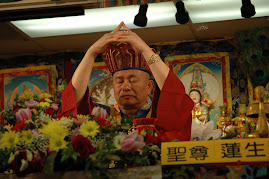


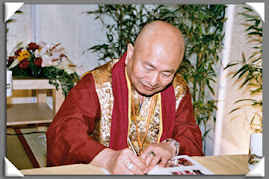

Om Wa Jera Ta Mo Sie
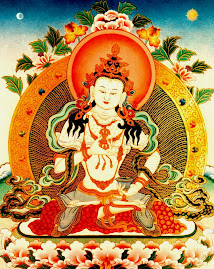
Om Pie Ca Sa To A Hum Phei

Om Cing Mu Siddhi Hum
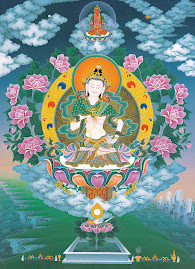

Om A Mi Te Wa Se

Om Mane Padme Hum

Om, Ha Ha Ha, Wei San Mo Ye, Soha

Om Cale Cule Cundi So Ha

Om, Cem Pa La Cha Len Cha Na Ye, So Ha

Om, A Hum, Pie Ca Kulu, Pie Ma, Sie Ti, Hum, Siek

Om, A Hum, Guru Pei, A Ho Sa Sa, Maha Lian Sheng, Siddhi, Hum

Tie Ya Tha, Om, Pie Kha Ce Ye, Pie Kha Ce Ye, Ma Ha, Pie Kha Cie Ye, La Cha, Sa Mo, Cia Te Hei, Soha
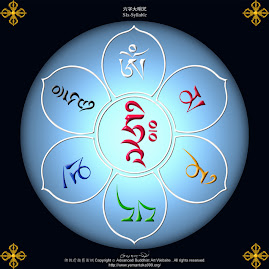
Om Mane Padme Hum
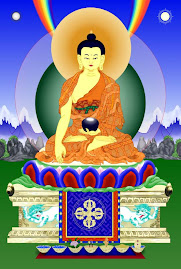
Om Moni Moni Maha Moni Se Cia Moni So Ha

Om Tare Tutare Ture So Ha
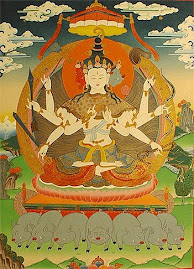
Om, Mo Li Zhi Yi, Soha

Om Ha Ka Ma La Wa La Ya So Ha

Om, Chou Li, Ka La Lu Pa, Hum Khan, Soha

Namo Samantho Wajera Lan Han
Little Spot of the TBSN Student
Yao Che Cing Mu
Om Cing Mu Siddhi Hum
GM with 5 Talisman

Om Guru Lian Sheng Siddhi Hum
GM short Mantra

Om Guru Lian Sheng Siddhi Hum
GM in Several Forms

Labels
- Dharmapala (4)
- GM Dharma (40)
- Sutra (16)
- TBS Master Dharma (3)
Blog Archive
-
▼
2008
(37)
-
▼
January
(36)
- Mudra_1
- GM_Kalacakra 2007
- Special Dates in 2007
- Keeping the Codes and Precepts
- House of Gold
- Don`t Let the Elderly Feel Lonely
- Passing the Torch
- A list of offerings for Fire Puja
- Instant Offering
- Is Burning Paper Gold Superstitius
- Ksitigarbha Sutra
- Kuan Kong
- Making Offering & Prostation
- Master V.A. Samantha & Jesus
- The Lost Years of Jesus
- The Metta Sutra
- The Method For Mara Prevention and Shrine Protection
- The Great Homage
- Empowerment
- How to Pay Respects to FU Protective Charms
- Invocation
- Generosity
- How Should Cutivators View Money
- How to visualize the Mantra Sounds
- Karandavyuha Sutra
- Right View
- Rules for Offering Incense
- Slack from being too familiar
- The Antidotes Against Doubt
- The Antidotes Against Pride
- The Antidotes Against Greed
- Tthe Antidotes Against Hatred
- The Antidotes Against Ignorance
- The Birthday of Buddhas and Bodhisattvas
- True Practice
- Vegetarian
-
▼
January
(36)
Vairocana Buddha

Om Pie Ca Ta Tu Fan
Amitaba (3's)

Amitaba (3's)

Amitaba stand on Lotus

Om Ami Te Wa Se
Amitaba with Character Fo

GM KL Kalachakra Homa 2007

GM with Kalachakra Mudra

GM_1

GM_2

GM_3

GM_4

GM in writing

Chien Sou Kwan Im

Om Wa Jera Ta Mo Sie
Vajrasattva

Om Pie Ca Sa To A Hum Phei
Golden Mother

Om Cing Mu Siddhi Hum
Vajrasattva_2

Amitofo

Om A Mi Te Wa Se
Kwan Im Phusa

Om Mane Padme Hum
Ti Cang Wang Phusa (Ksitigarbha)

Om, Ha Ha Ha, Wei San Mo Ye, Soha
Cundhi

Om Cale Cule Cundi So Ha
Yellow Jambala

Om, Cem Pa La Cha Len Cha Na Ye, So Ha
Padmasambhava

Om, A Hum, Pie Ca Kulu, Pie Ma, Sie Ti, Hum, Siek
Hua Kuang Ce Chai Fo

Om, A Hum, Guru Pei, A Ho Sa Sa, Maha Lian Sheng, Siddhi, Hum
Medicine Buddha

Tie Ya Tha, Om, Pie Kha Ce Ye, Pie Kha Ce Ye, Ma Ha, Pie Kha Cie Ye, La Cha, Sa Mo, Cia Te Hei, Soha
Sad Aksara

Om Mane Padme Hum
Sakyamuni Buddha

Om Moni Moni Maha Moni Se Cia Moni So Ha
Tara

Om Tare Tutare Ture So Ha
Marici Phusa

Om, Mo Li Zhi Yi, Soha
Kalacakra

Om Ha Ka Ma La Wa La Ya So Ha
Yamantaka

Om, Chou Li, Ka La Lu Pa, Hum Khan, Soha
Acala

Namo Samantho Wajera Lan Han
About Me
- Albertus Cahyadi
- Beijing, China
- Adhistana by Grand Master: 1) Vairocana Buddha, October 1996. 2) Fire Puja, Inner Vase Practice and Inner Fire Practice Empowerment, 19th October, 2007. 3) Kalachakra True Vajrakila Practice Empowerment, The Golden Mother Seven Great Practices Empowerment, Money Horse Empowerment, 20th October, 2007.